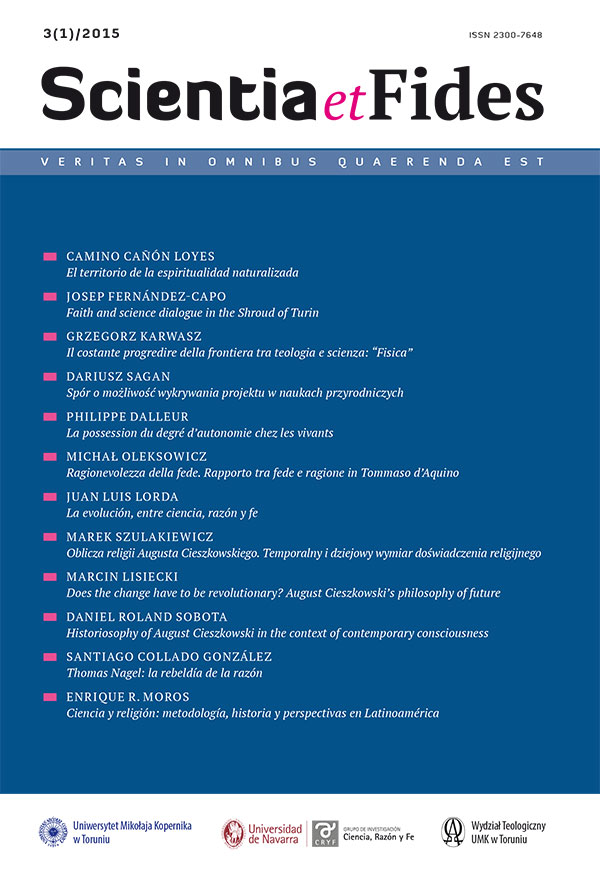Does the change have to be revolutionary? August Cieszkowski’s philosophy of future
DOI:
https://doi.org/10.12775/SetF.2015.002Parole chiave
August Cieszkowski, George Hegel, Young Hegelians, future, revolution, religion, social changeAbstract
The main purpose of this article is analysis of question of future in philosophy of August Cieszkowski. Amog Polish philosophers Cieszkowski was one of the most important thinker, who creatively developed the philosophy of George Hegel, added new question, such as “future”. For clarity of analysis the essay is divided into two parts. The first part is connected with problem of future in Cieszkowski’s philosophy with references to social and religious fields. The second one included analysis of relations between social and religious changes and revolution.Riferimenti bibliografici
Cieszkowski August. 1908. Prolegomena do historiozofii. Poznań.
Cieszkowski August. 1922. Ojcze nasz. Wstęp poprzedzony traktatem o drogach Ducha, t. 1. Poznań: Fiszer i Majewski.
Cieszkowski August. 1923a. Ojcze nasz, t. 2. Poznań: Fiszer i Majewski.
Cieszkowski August. 1923b. Ojcze nasz, t. 3. Poznań: Fiszer i Majewski.
Cieszkowski August. 1972. Prolegomena do historiozofii. In: August Cieszkowski, Prolegomena do historiozofii. Bóg i palingeneza oraz mniejsze pisma filozoficzne z lat 1838-1842. Warszawa: PWN.
Dembowski Edward. 1955. Myśli o przyszłości filozofii. In: Edward Dembowski, Pisma. 1844-1846, t. IV. Warszawa: PWN.
Habermas Jürgen. 1983. Heglowska krytyka rewolucji francuskiej. In: Jürgen Habermas. Teoria i praktyka. Wybór pism. Warszawa: PIW.
Jakubowski Marek. 1989. Czyn, przyszłość, naród. Poglądy filozoficzne Augusta Cieszkowskiego. Warszawa: PWN.
Janion Maria. 2007. Gorączka romantyczna. Gdańsk: słowo/obraz terytoria.
Karol Marks. 1975. Tezy o Feuerbachu. In: Karol Marks, Fryderyk Engels. Dzieła, t. 3. Warszawa: KiW.
Keller Józef. 1948. Czyn jako wyraz postawy moralnej Augusta Cieszkowskiego. Lublin: Towarzystwo Naukowe KUL.
Kołakowski Leszek. 2000. Główne nurty marksizmu. Powstanie, t. 1. Poznań: Zysk i S-ka.
Lewis Clive S. 1993. Listy starego diabła do młodego. Warszawa: PAX.
Marks Karol, Engels Fryderyk. 1976. Manifest komunistyczny. Warszawa: KiW.
Sajdek Wiesława. 2008. Postęp bez rozbioru. Podstawy teorii dynamizmu społecznego w filozofii Augusta Cieszkowskiego. Lublin: Wydawnictwo KUL.
Sojka Marek. 1986. Neomesjanizm a recepcja Cieszkowskiego. Wrocław-Warszawa-Kraków-Gdańsk-Łódź: Ossolineum.
Szulakiewicz Marek. 2001. Czas i to, co ludzkie. Szkice z chronozofii i kultury. Toruń: Wydawnictwo Naukowe UMK.
Walicki Andrzej. 1972. Pisma Cieszkowskiego z lat 1838-42 na tle epoki. In: August Cieszkowski. Prolegomena do historiozofii. Bóg i palingeneza oraz mniejsze pisma filozoficzne z lat 1838-1842. Warszawa: PWN.
Walicki Andrzej. 1996. Marksizm i skok do królestwa wolności. Dzieje komunistycznej utopii. Warszawa: Wydawnictwo Naukowe PWN.
Żółtawski Adam. 1922. Przedmowa. In: August Cieszkowski. Ojcze nasz. Wstęp poprzedzony traktatem o drogach Ducha, t. 1. Poznań: Fiszer i Majewski.
Downloads
Pubblicato
Come citare
Fascicolo
Sezione
Licenza
Copyright (c) 2015 Scientia et Fides

Questo lavoro è fornito con la licenza Creative Commons Attribuzione - Non opere derivate 4.0 Internazionale.
CC BY ND 4.0. The Creator/Contributor is the Licensor, who grants the Licensee a non-exclusive license to use the Work on the fields indicated in the License Agreement.
- The Licensor grants the Licensee a non-exclusive license to use the Work/related rights item specified in § 1 within the following fields: a) recording of Work/related rights item; b) reproduction (multiplication) of Work/related rights item in print and digital technology (e-book, audiobook); c) placing the copies of the multiplied Work/related rights item on the market; d) entering the Work/related rights item to computer memory; e) distribution of the work in electronic version in the open access form on the basis of Creative Commons license (CC BY-ND 3.0) via the digital platform of the Nicolaus Copernicus University Press and file repository of the Nicolaus Copernicus University.
- Usage of the recorded Work by the Licensee within the above fields is not restricted by time, numbers or territory.
- The Licensor grants the license for the Work/related rights item to the Licensee free of charge and for an unspecified period of time.
FULL TEXT License Agreement
Stats
Number of views and downloads: 765
Number of citations: 0



